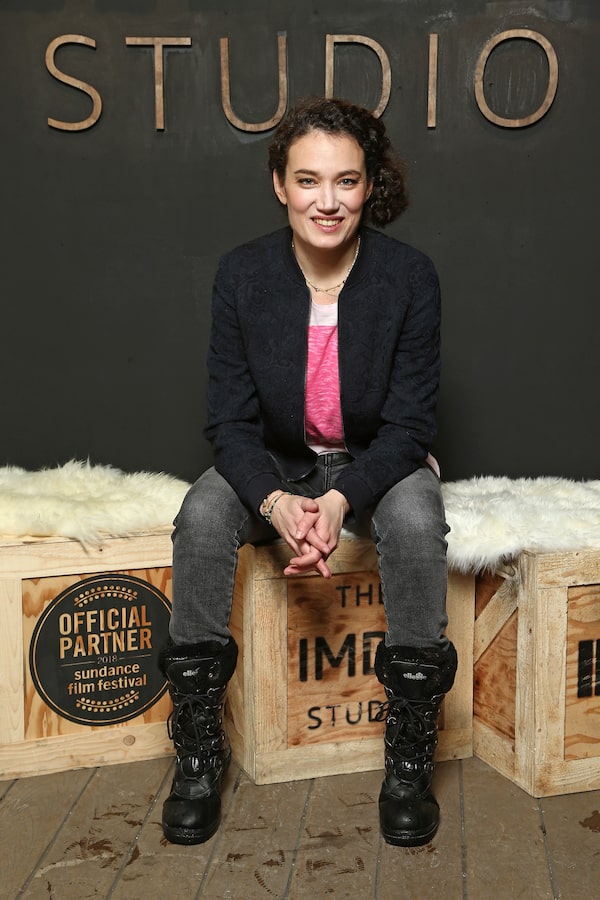
Director Coralie Fargeat at The Sundance Film Festival on Jan. 20, 2018 in Park City, Utah.Tommaso Boddi/Getty Images for IMDb
To say that the woman at the centre of the new thriller Revenge is the first cinematic hero of the #MeToo era is a bit of a misnomer. Instead, the determined and bold and bloody-minded Jen (Matilda Lutz) − who exacts vengeance upon the trio of men who left her for dead − is more a response to decades’ worth of slick, and sick, rape-revenge fantasies crafted almost exclusively by male filmmakers. Here, first-time feature director Coralie Fargeat finally allows audiences to watch a familiar story unfold from a woman’s perspective. Revenge has no male gaze, only Fargeat’s uncompromising deconstruction of the themes usually associated with the genre: privilege, entitlement, victim-blaming. Ahead of the film’s release this weekend, The Globe spoke with the French director about genre, violence and accidental timing.
Have you always been interested in genre films, or more specifically these kind of exploitation thrillers?
In genre itself, yes. Or movies that, by definition, are only briefly real. I love filmmakers like David Cronenberg, David Lynch, Paul Verhoeven − all these directors who use violence or fantastic stories to explore real life. I wanted my first feature to be strongly in that direction.
What about the rape-revenge genre in particular? I’m thinking of films like Ms .45, I Spit On Your Grave …
I haven’t seen I Spit On Your Grave, to be honest, and the rape-revenge films are not all that interesting to me in the first place. I wanted to tell a story about the journey of this character and what’s happening to her, and the rape is just the most extreme and symbolic way to crystallize the violence that she has to endure in the world. My interests were more like Mad Max: Fury Road, or Rambo − movies where the hero is rising from their own ashes. I think revenge films were more inspiring for me than the rape-revenge movies.
The violence here is extreme. Did you ever think, “There’s no way I’m going to be able to get away with that?”
It was always the level of violence I had in mind. I didn’t want the violence to just be horrific, though, like a Saw or Hostel, violence that hurts the body. I just more wanted to create a crazy level of violence where excess is a character in itself. The blood could create something operatic, and the film is so excessive that it brings a kind of absurdity out that makes it bearable. That’s what directors like [Quentin] Tarantino and Park Chan-wook do − they are so extreme that it becomes unreal. I think violence is a very artistic form of expression, depending on the way you’re dealing with it.
A third of the way through, Jen is impaled on a tree, leading to her sort of resurrection. That’s one hell of an operatic symbol there …
It’s certainly related to crucifixion, the symbolism of it. I can’t totally or rationally explain it, but I know that having her body impaled there, with her being near death … it’s a very powerful image for me. You have to go far in how much a character endures for them to be reborn. The scene came from a sense that I wanted to tell this story, but not in a very realistic way. I needed a powerful moment, a powerful symbol, so that everything takes shape right in front of the audience.
The film screened at TIFF just a few weeks before the #MeToo conversation exploded. Do you feel, now that it’s being released, is there any sort of extra spotlight or resonance given to it?
It’s a very strong coincidence that the movie, after I finished it, just a few months later the Weinstein story was revealed. But I also think it’s not that coincidental when you think about it. Everything that was revealed in the Weinstein story was already out there for a long time. It’s just that nobody was listening, or had the power to let these things be known. For me, it’s kind of special and beautiful that the film and art meet at some point with the news. These are moments you can’t totally explain. I’m happy if the movie can be seen as a conversation-starter for women.
Revenge opens May 11 in Toronto, Vancouver, and Montreal.
This conversation has been condensed and edited.
 Barry Hertz
Barry Hertz